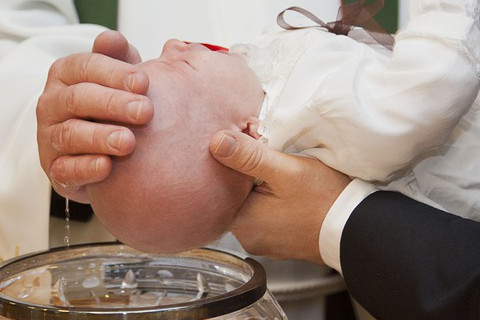
Baptism is the Sacrament of Spiritual rebirth and initiation into the Christian Faith. Through the symbolic action of washing with water and the use of appropriate ritualistic formula, the baptized person is cleansed of all sins and incorporated into Christ. He/ she become a member of the Church and receive the graces of supernatural life.
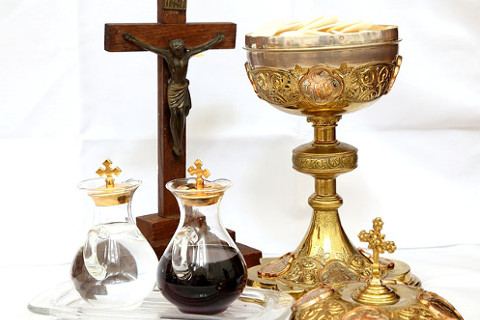
Holy Communion is the Body and Blood of Jesus which becomes present for us when the priest consecrates the bread and wine at Mass. Jesus gives Himself to us in Communion as a sign of God’s presence and to deepen our relationship with Him and His disciples.
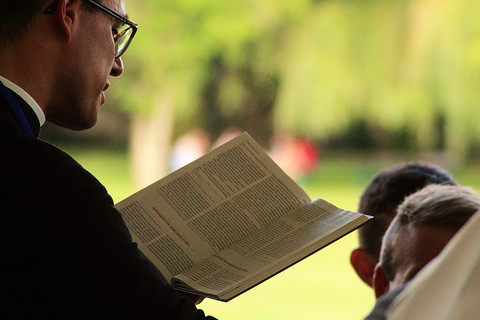
The purpose is to initiate our catholic youth in building their faith stronger in Jesus Christ and awakening their faith to serve His Church through a curriculum drafted by the Archdiocese. As the Catholic youth matures and becomes a candidate for Confirmation the preparations assist the child to encounter the grace of God through outpouring of the Gifts of the Holy Spirit.
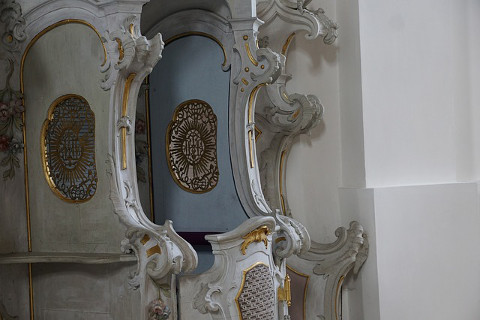
The Catechism of the Catholic Church States (CCC): "the forgiveness of sins committed after Baptism is conferred by a particular sacrament, called the sacrament of conversion, confession, penance, or reconciliation." (CCC 1486)
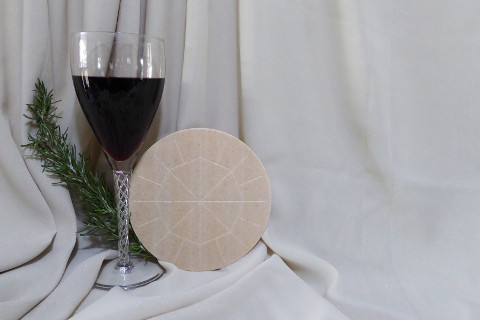
The Sacrament in which the sick are anointed with holy oil is called Holy Anointing. Only a priest can administer the anointing of the sick. If a person is to be operated family, friends and those who care for the sick, have the responsibility to inform the priest early, and help prepare the sick person for the reception of the Sacrament of Anointing of the sick.

The following guidelines are being used in order to ensure that the sanctity and reverence of the church is preserved and the Eucharistic celebration with the Rite of Marriage is conducted with devotion, dignity and decorum. Some of these guidelines are also applicable for the celebration of any anniversary of marriage
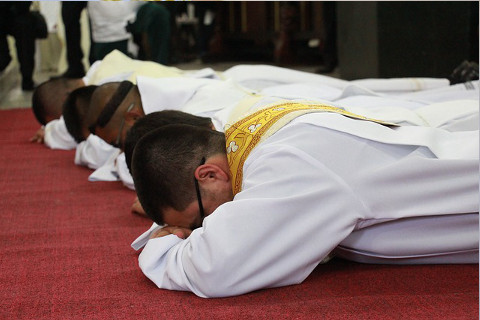
Holy Order is the Sacrament through which the mission entrusted by Christ to His apostles continues to be exercised in the church until the end of time. Thus it is the Sacrament of Apostolic ministry (Vat II).
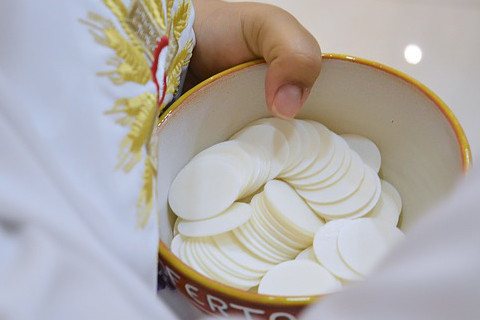
Sunday Catechism is meant for all school going children up to Std X and is held every Sunday at St. Xavier’s High school. Catechism from 08.00 am to 09.00 am followed by Mass. All parents have the responsibility to send their school going children to learn more about the life of Jesus and live better Spiritual life.

Upon the death of a loved one only a family member must contact the priest in the parish before fixing the date and the time of the funeral. Do not ask the undertaker to do the same.
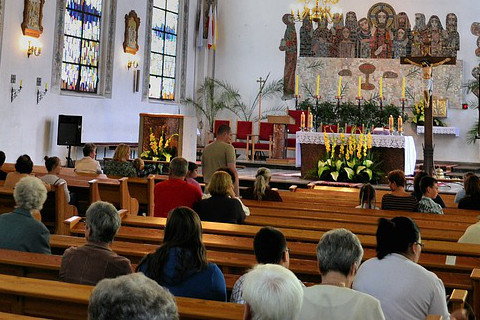
One of the important precepts of the Church is to hear Mass on Sundays and holy days of obligation. There are 52 Sundays and 2 days of obligation (15th August and 25th December). To fulfill the days of obligation every Christian is expected to attend Mass either on Saturday evening after 5.00pm or on Sundays.
Baptism is the Sacrament of Spiritual rebirth and initiation into the Christian Faith. Through the symbolic action of washing with water and the use of appropriate ritualistic formula, the baptized person is cleansed of all sins and incorporated into Christ. He/ she become a member of the Church and receive the graces of supernatural life.
Baptism is known as ‘Gateway to the Sacraments’. Hence only a validly baptized person can receive all the other sacraments in the church. Therefore it is important that every child that is born of Catholic parents must be baptized as soon as possible.
Guidelines:
Adult Baptism:
Adults preparing for the sacraments of Christian initiation should follow the Adult Catechumenate programme as indicated in the Rite of Christian Initiation of Adults (RCIA). Only after the completion of the RCIA course the adult baptism will take place at the Easter Vigil Service. RCIA course starts every year in June.
The Spiritual Director: Fr. Michael Pinto
Communion Catechists: Sr. Jyothi, Sr. Matilda, Ms. Shital Sequeira and Ms. Juliet
Holy Communion is the Body and Blood of Jesus which becomes present for us when the priest consecrates the bread and wine at Mass. Jesus gives Himself to us in Communion as a sign of God’s presence and to deepen our relationship with Him and His disciples.
Guidelines:
Preparing your child for the First Holy Communion
Spiritual Director: Fr. Michael Pinto
Co coordinator : Sherly Raj (Mob. No.9820494677)
Catechists: Sr. Selma Fernandes, Mr. Nelson Mendonca, Mrs. Iona Pereira, Ms. Shradha Mendonca and Mr. Lancy Jivani
The purpose is to initiate our catholic youth in building their faith stronger in Jesus Christ and awakening their faith to serve His Church through a curriculum drafted by the Archdiocese. As the Catholic youth matures and becomes a candidate for Confirmation the preparations assist the child to encounter the grace of God through outpouring of the Gifts of the Holy Spirit.
Confirmation is a compulsory Sacrament to be administered in order to be eligible for the Sacrament of Matrimony.
Every child and family who desires to receive the Sacrament is expected to attend and participate in the Rite of Enrolment. This ceremony allows the student, parent and parish to engage mutually in a covenant, a promise that each will do its part to lead the student to confirmation.
Enrolment Procedure:
Guidelines:
The Catechism of the Catholic Church States (CCC): “the forgiveness of sins committed after Baptism is conferred by a particular sacrament, called the sacrament of conversion, confession, penance, or reconciliation.” (CCC 1486)
“Those who approach the Sacrament of penance obtain pardon from God’s mercy for the offense committed against Him, and are at the same time, reconciled with the church which they have wounded by their sins and which by charity, by example, and by prayer, labours for their conversion.” (LG 11.2)
“The movement of return to God entails sorrow for and abhorrence of sins committed, and the firm purpose of sinning no more in the future. Conversion touches the past and the future, and is nourished by hope in God’s mercy.” (CCC 1489-90)
Structure of Confession
The normal practice for administration of the Sacrament of penance is in private with only the penitent and the priest present.
To begin, the penitent kneels and, by custom, says: “Forgive me, Father, for I have sinned” , and may add, “It has been (Time) since my last confession” and begins his/her confession.
After hearing the confession, the priest assigns a penance, and the penitent accepts the penance with the prayer.
At the end say “Lord have mercy on me a sinners”.
Confession Timings: On request/At any time.
The Sacrament in which the sick are anointed with holy oil is called Holy Anointing. Only a priest can administer the anointing of the sick. If a person is to be operated family, friends and those who care for the sick, have the responsibility to inform the priest early, and help prepare the sick person for the reception of the Sacrament of Anointing of the sick.
By the Sacrament of Anointing of the Sick the Church strengthens those who are ill to the suffering of the glorified Lord, that he may raise them up and save them. The Sacrament is a personal encounter of the sick person with our loving, healing God, but it is also a Sacrament of the Community.
Like all Sacrament, the Anointing of the Sick is a liturgical and communal celebration, whether it takes place in the family home, a hospital or in a church for a single person or a whole group of the sick persons. God offers the anointed person the grace to be healed and comforted, to overcome anxiety and despair and to be made whole. It is an affirmation for Christians that they are supported in their suffering, and that there are others who care about them in their time of need.
Guidelines:
The Sacrament of Anointing is for ‘Healing’ and not for persons who are at the point of ‘Dying’.
Sick Call can be given at any time but Please send a person to call a priest. No sick call on telephone will be entertained.
Inform the priest if the sick person is able to receive communion or not.
Do not force the sick person to make his/her confession.
If in hospital, call the priest from the church closest to the hospital or nursing home.
The following guidelines are being used in order to ensure that the sanctity and reverence of the church is preserved and the Eucharistic celebration with the Rite of Marriage is conducted with devotion, dignity and decorum. Some of these guidelines are also applicable for the celebration of any anniversary of marriage.
The person to marry has to personally come and meet any of the priests in the parish at least three months in advance.
If the marriage is to be celebrated at this church, the date and the time of the marriage should be fixed in consultation with a priest of this church. This should be done prior to the booking of the hall or making any other arrangements.
In the Archdiocese of Bombay as prescribed by the Catholic Bishops Conference of India (CBCI), the marriage procedure is initiated in the Parish of the bride, irrespective of where the marriage is to be celebrated.
It is obligatory to do the marriage preparation course early.
A new Baptism certificate i.e. dated within 6 months from the date of the intended marriage should be produced at the time of filling the Pre Nuptial Form.
Marriage preparation course certificate should be produced at the time of filling the Pre Nuptial Enquiry Form.
For a marriage with a person who is not a Christian, a dispensation from the Archbishop of Bombay is necessary. No banns are read.
The dispensation may be granted if certain conditions are fulfilled. For such a marriage it is necessary to contact one of the priests of the parish as early as possible. In case of marriage taking place in a native place or any other place outside the Archdiocese of Bombay, the marriage procedure according to the Archdiocese of Bombay has to be followed. The no Objection Certificate (NOC) will be issued only when proper marriage procedure has been completed. Results of the banns from the boys parish to be send to the girls parish…
An envelop marked “Our Contribution” should be handed to the priest as an offering to the church. And a receipt is given.
Marriage is a communitarian celebration and hence need to be celebrated during the parish masses. However for pastoral reasons, marriages in our church may take place outside the scheduled mass with the prior permission of the Parish Priest.
If the marriage is held on a Sunday during a scheduled mass, the liturgy of the day will take precedence.
The scripture readings are in the Lectionary and the prayers for the celebrant are in the missal. For the readings at mass consult the priest concerned. It is not necessary to have a booklet with these readings and prayers. The readings at mass must be done from the Lectionary.
Please prepare yourselves also spiritually for this great event one or two days before your wedding day. Have at least 30 minutes of spiritual preparation with your whole family, could have Bible reading, rosary, sharing your ideas of marriage. Please make a good confession as well.
For prayer of the faithful contact the main celebrant. Altar servers are to be contacted. Fresh flowers to be arranged before the mass. Keep your rings and 2 witnesses ready before the mass. The witnesses must know they are undertaking. (not parents – only adults)
LECTIONARY
Those who can read effectively and are accustomed to read at mass should be entrusted with the readings and prayer of the faithful. Persons should not be selected just because they are relatives or because they have to be honored with a role.
The rite of Marriage commences after the homily. The witnesses, only Catholics, should be selected earlier, have to come forward for the rite. The rings should b available. There should be no confusion at this stage. The rite of the marriage cannot be changed or re – formulated.
The introduction, prayers of the faithful and hymns sung during the liturgical celebration should be approved by the priest concerned. The liturgy must be prepared at least two weeks before the date of the marriage with the help of the priest. An approved list of hymns with the choir leaders. (Singing of a nuptial song after the rite of marriage and lighting of the candle is not liturgical and hence not allowed in our church.)
THE Church is a house of prayer and worship. Hence all should come to church dressed in an appropriate manner especially the bride and the bridesmaids.
All those who play an active part in the liturgy should be respectfully and appropriately dressed.
No artificial flowers and leaves should be used. Only fresh flowers near the altar. confetti and crackers are not permitted in the church premises.
Video shooting though discouraged in the church, is permitted only during the
The photographers and the video crew should be informed that they should move about in a respectful manner as benefitting an place of worship. They should not stand in the sanctuary or on the steps leading to the sanctuary, but in one place only.
The photographer should not convert the sanctuary into a studio by taking too many group photographs. Please co – operate to make your day of Marriage a Memorable Day to Remember.
Holy Order is the Sacrament through which the mission entrusted by Christ to His apostles continues to be exercised in the church until the end of time. Thus it is the Sacrament of Apostolic ministry (Vat II).
To be a priest or deacon a male person has to undergone training in the seminary or religious house for a few years (6-10 years). The Training includes One year orientation and (Novitiate for religious) Philosophy/theology and 1 year Diaconate ministry. A religious is trained and lives in a community as per rules laid down in their constitution.
Canon 529 lays down that a priest is to strive to serve the people entrusted to his care with diligence and humility and be the presence of Christ among God’s people.
Spiritual Director : Fr. Michael Pinto
Co-ordinator: Mrs. Juliet Almeida (Mob. No.9769722072)
A small write-up on what Sunday Catechism is all about
Jesus Christ, the greatest teacher of all, loved children dearly. In Matthew Chapter 18 verse 6, Jesus said for "whoever causes one of these little ones who believe in me to sin, it would be better for him to have a great millstone fastened round his neck, and to be drowned in the depth of the sea."
In this world, Sunday Catechism acts as a safe place where children can create strong ties and friendships, with their peers, and with Jesus Christ.
The first and simplest task of Sunday Catechism is to teach the Bible to our children. We learn about God's love as we hear its stories and parables. In Sunday Catechism, children develop a Christian understanding of the purposes of Scripture. Through these experiences with the Bible in Sunday Catechism, they learn to recognize God's call to them.
The second task of Sunday Catechism is to help us accept God's grace. It is the acceptance of God's saving grace offered through Jesus Christ that enables one to become the person God created him or her to be.
Thirdly, Sunday Catechism helps us grow in Christian faith. Christian faith becomes a reality when the lessons of the Bible and our personal experiences of God's love inspire us to love God and to trust
The fourth responsibility that Sunday Catechism holds is to guide our children to become mature members of a Christian community. Sunday Catechism teaches us that the ability to grow in relationship so that they are able to carry their experience of God's presence and love into the activities of their everyday lives.
Last and certainly not least, the ultimate task that Sunday Catechism strives to meet is to help its students answer God's Call to Christian living which comes through study, worship, and learning together.
Ultimately, fostering and nourishing our Sunday Catechism is a sacred responsibility. To give our religious education less than our best would be unfaithful to the life God has called us to live and to the world God has called us to serve. This opportunity to appreciate just how important Sunday Catechism is for the future of our congregation.
Catechist List 2017 - 18
|
Jr, Sr Kg & 1st Std |
Sr. Smitha Dsouza Dorothy Dsouza |
|
2nd Std |
Shital Sequeira Venessa Kini |
|
3rd Std |
Rosy Pinto Princey Jayaraj |
|
4th Std |
Sr. Laila Monteiro Shyna Dcruz Councel Fernandes |
|
5th Std |
Mercia Cordeiro Jenifer Gomes |
|
6th Std |
Juliet Almeida Alice Baretto |
|
7th Std |
John Rayan |
|
8th Std |
Yogita Prabhu Emilian Dsouza |
|
9th & 10th Std |
Regina Almeida |
Guidelines:
Upon the death of a loved one only a family member must contact the priest in the parish before fixing the date and the time of the funeral. Do not ask the undertaker to do the same.
Kindly get a photocopy of the Municipal death certificate and Doctors certificate for our parish record.
The funeral Mass is held at Holy Trinity Church. The burial depends whether the family has submitted the dully filled Parish Census form. If the name of the deceased person is verified in the Parish Census the burial rite will take place in the Church cemetery.
If a family would like to invite a priest or a deacon from another Parish to preside at any of the funeral rites, they are most welcome. However, the family must inform the priests in the parish about the same. The guest priests should strictly follow the guidelines formulated by the Parish.
A prior permission should be obtained from the Parish Priest before any work is undertaken in the cemetery.
The funeral Mass timings are as follows: 10.00 am and 4.00 pm.
One of the important precepts of the Church is to hear Mass on Sundays and holy days of obligation. There are 52 Sundays and 2 days of obligation (15th August and 25th December). To fulfill the days of obligation every Christian is expected to attend Mass either on Saturday evening after 5.00pm or on Sundays.
One is expected to be on time for the Mass, receive Holy Communion for a better participation of the Eucharist. To receive Holy Communion one should fast at least one hour before receiving communion.
